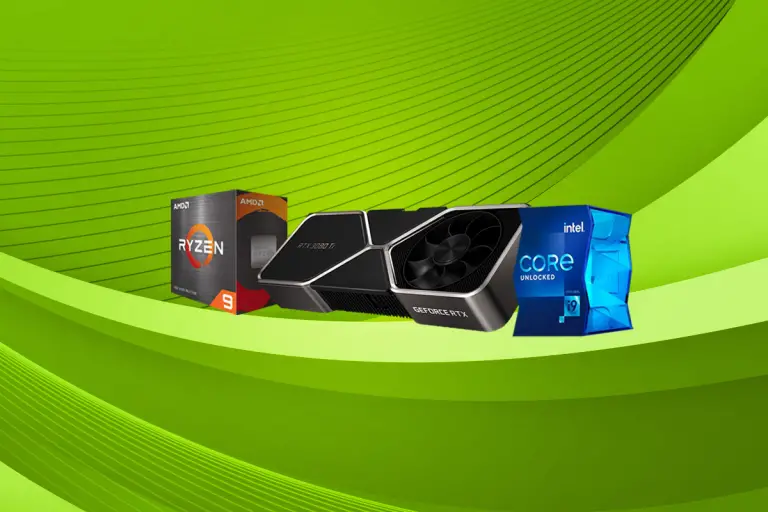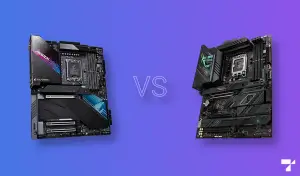The release of the RTX 3080 Ti is probably the most exciting Ti upgrade in Nvidia’s lineup because it’s almost as powerful as the RTX 3090. However, being considerably ahead of the RTX 3080 in terms of performance means that you’ll need to pair the 3080 Ti with a CPU that performs just as well without creating a bottleneck. Therefore, we have carefully selected this list of the best CPUs for RTX 3080 Ti.
Once you compare the specifications of the RTX 3080 Ti to the 3080 in more detail, you’ll notice that it’s going to be around 13% more powerful. In fact, it’s barely behind Nvidia’s behemoth, the RTX 3090, by around 4%. The RTX 3080 Ti has more GPU cores, tensor cores, RT cores, as well as VRAM than its smaller brother, so naturally, we’ll need an adequate CPU that can match this performance increase.
If you want to get a smoother 1440p or 4K gaming experience and utilize more computationally demanding software, you can match the RTX 3080 Ti with one of the CPUs listed below depending on your needs.
Best CPUs for RTX 3080 Ti
1. AMD Ryzen 9 5900X
Verdict
The Ryzen 9 5900X is a high-end processor for enthusiasts. It is a perfect match for the RTX 3080 Ti for both gaming and other computationally demanding tasks.
Specifications
Architecture: Zen 3 | Socket: AM4 | Cores/Threads: 12 / 24 | Base Frequency: 3.7GHz | Boost Frequency: 4.8GHz | TDP: 105WBenefits
- Performs extremely well in 4K gaming setups
- Powerful multi-core processing for demanding tasks
- Supports the latest PCIe 4.0
Drawbacks
- Doesn’t come with a cooler
- Expensive
AMD’s 5900X is an enthusiast-grade CPU that is fantastic for a stable 4K gaming experience as well as performing demanding tasks, like content creation, rendering, and so on. In fact, with 12 cores and an achievable boost frequency of 4.8GHz, this processor won’t even reach its maximum capability in games. That said, the 5900X blows most of the competition out of the water. Compared to what Intel has to offer, this CPU comes with a much larger 70MB cache. Its architecture is also superior and it only requires 105W of power. That’s impressive for such a high core count and frequency.
As mentioned, the 5900X is not made for the average gamer. If you plan to game at 1080p or even 1440p only, this model is probably overkill. You can opt for a 5800X or even a 5600X and you won’t feel much of a difference. However, if you work with computationally demanding software, the 5900X is hard to beat, especially for its price. It’s also future-proof, so if you buy it together with an RTX 3080 Ti, your system will be fairly cutting edge for several years.
2. Intel i9-11900K
Verdict
The 11900K is a single-core powerhouse, but it has 2 cores less than the previous generation and high power requirements. Nevertheless, it is still a powerful CPU and a great pair for the RTX 3080 Ti.
Specifications
Architecture: Rocket Lake | Socket: LGA 1200 | Cores/Threads: 8 / 16 | Base Frequency: 3.5GHz | Boost Frequency: 5.30GHz | TDP: 125WBenefits
- Great 1440p and 4K gaming performance
- Thermal Velocity Boost enables a whopping 5.3GHz boost to single-core performance
- Supports PCIe 4.0
Drawbacks
- Expensive for just 8 cores
- Requires a lot of power and cooling
The i9-11900K performs extremely well in games, but it’s overall a disappointing processor. Compared to the previous-gen 10900K, this CPU has 2 cores less and a 200MHz smaller base frequency. In addition to this downgrade, multithreaded performance still falls behind the similarly priced Ryzen 5900X. That said, we can’t complain about single-core performance and the processor’s ability to unlock the RTX 3080 Ti’s full potential. But there are better options out there if you plan to use your system for computationally demanding tasks.
The 11900K is best for gamers and those who don’t want to switch to an AMD system. For everyone else, there are better alternatives out there, like the 5900X. The 11900K also has really high power requirements when overclocked and you need to invest in a high-end cooler to deal with the overheating.
3. AMD Ryzen 9 5950X
Verdict
If the Ryzen 9 5900X isn’t enough, take it up a notch with the 5950X. The only thing better than this beast is a Threadripper, so you’ll get all the performance you need.
Specifications
Architecture: Zen 3 | Socket: AM4 | Cores/Threads: 16 / 32 | Base Frequency: 3.4GHz | Boost Frequency: 4.9GHz | TDP: 105WBenefits
- Top performance you can buy without breaking the bank
- Performs extremely well in games as well as demanding apps
- Supports PCIe 4.0
Drawbacks
- Cooler isn’t included
- Very Expensive
If you want a full-proof RTX 3080 Ti system that you set up and forget for the next few years, nothing much can beat the performance a Ryzen 9 5950X can provide. This processor can deliver a whopping 4.9GHz clock speed and its 16 cores will handle any demanding software you throw at it. The 5950X’s purpose is to provide high multi-threaded processing speeds.
What’s even more impressive is the 72MB memory cache and the low power requirements. Intel doesn’t have anything that can compete with this chip in the same price range. Especially when you consider the fact that Intel processors run hotter and are significantly more power-hungry.
That said, when it comes to 1080p or 1440p gaming performance, the 5950X is definitely overkill. But if your goal is 4K gaming then you can somewhat justify purchasing this processor. However, if you create content or have to work with a lot of computationally demanding CPU tasks that require ample core and threads, the 5950X is one of the best consumer-grade CPUs you can utilize.
4. AMD Ryzen 7 5800X
Verdict
If you’re looking for a mainstream gaming processor, go for the cheaper 5600X. The 5800X delivers almost the same performance in games. However, for content creation and demanding applications, the 5800X is a better choice.
Specifications
Architecture: Zen 3 | Socket: AM4 | Cores/Threads: 8 / 16 | Base Frequency: 3.8GHz | Boost Frequency: 4.7GHz | TDP: 105WBenefits
- High performance in applications
- Great 1440p performance and good for 4K setups
- PCIe 4.0 support
Drawbacks
- Cooler isn’t included
- Gaming performance similar to 5600X
The Ryzen 7 5800X is an 8-core processor that is good enough for most tasks, except for the highly demanding ones you encounter in a professional environment. With clock speeds that reach 4.7GHz and PCIe 4.0 support, your only gaming limits are imposed by the RTX 3080 Ti. If the GPU can handle it, so can the 5800X. Remember that games still don’t take full advantage of multi-core processing. That is why the 5600X, which is significantly cheaper, is just as good as the 5800X when it comes to gaming. The difference is marginal.
Unfortunately, AMD disappointed fans of mid-range setups by not including their famous Wraith Prism cooler with this Ryzen 7 generation. Only CPUs with a TDP lower than 65W come with it these days. So, if you choose the 5800X instead of the 5600X you’ll have to keep that in mind.
The Ryzen 7 5800X is overall a good CPU for most RTX 3080 Ti. If you’re a 4K gamer, you don’t really need anything above it in terms of performance. However, it performs extremely well in demanding applications thanks to its powerful 8 cores. So, if you’re also a content creator looking for something decent for rendering, the 5800X is a good option. Only go a step higher with the 5900X if you want to save time.
5. Intel Core i7-11700K
Verdict
If you want to stick to Intel processors for gaming, the 11700K is powerful thanks to its single-core performance. However, when you consider the price and multithreaded performance, there are better options.
Specifications
Architecture: Rocket Lake | Socket: LGA 1200 | Cores/Threads: 8 / 16 | Base Frequency: 3.6 GHz | Boost Frequency: 5.0 GHz | TDP: 125WBenefits
- Performs well in 1440p and 4K gaming setups
- High overclocking potential, up to 5.0 GHz using Turbo Boost Max 3.0
- Supports PCIe 4.0
Drawbacks
- It’s power-hungry compared to Ryzen processors
- Intel still uses the 14nm node
When it comes to Intel processors we all expect great single-core performance which is really important in gaming. The i7-11700K doesn’t disappoint in this area. This CPU can reach up to 5.0GHz, making it a solid option for any RTX 3080 Ti setup. Multi-core performance is also pretty good, however, in the same price range, you can find better options from AMD. This 11th gen i7 is a bit expensive for what it has to offer compared to the competition.
Intel finally supports PCIe 4.0 so if you want to stick to Intel CPUs you’ll finally be able to start taking advantage of the GPUs PCIe 4.0 interface. Furthermore, the chip architecture was improved leading to a 19% IPC boost. That said, the 11700K requires a lot of power, especially if you want to overclock it and it will quickly overheat without a high-end cooler.
Overall, this i7 is best for Intel enthusiasts who don’t want to switch to the Ryzen alternative. The price as well as the old 14nm node and the problems that come with it aren’t worth it when we have so many options these days.
6. AMD Ryzen 9 3900X
Verdict
The Ryzen 9 3900X is a generation old, but it still offers amazing performance for the price you pay.
Specifications
Architecture: Zen 2 | Socket: AM4 | Cores/Threads: 12 / 24 | Base Frequency: 3.8GHz | Boost Frequency: 4.6GHz | TDP: 105WBenefits
- Great price for 12 powerful cores
- Supports PCIe 4.0 interface
- Wraith Prism Cooler included
Drawbacks
- Single-core performance could be better
The 3900X is a Zen 2 processor, but that doesn’t mean you should skip it and automatically go for Zen 3. In fact, this CPU is an amazing 12-core processor and it isn’t all that different from the 5000 series. It even supports PCIe 4.0, so nothing about it will limit your RTX 3080 Ti in the future. With 12 cores / 24 threads that can be pushed to a 4.6 GHz frequency, you’ll be able to enjoy any gaming and perform a wide variety of tasks that demand a lot of processing power.
In addition, this Ryzen 9 model comes with the Wraith Prism cooler included. If you don’t need to overclock your CPU to its maximum speed, this cooler is enough to keep temperatures within normal limits. The new Ryzen 9 5900X doesn’t include it anymore.
The Ryzen 9 3900X is a great option for gamers as well as professionals. It’s future-proof and together with the RTX 3080 Ti, you’ll be able to enjoy any games and create content without bottlenecking your GPU.
7. AMD Ryzen 5 5600X
Verdict
The 5600X is the king of mid-range systems. It’s powerful enough for a great gaming experience and more efficient than most chips on the market.
Specifications
Architecture: Zen 3 | Socket: AM4 | Cores/Threads: 6 / 12 | Base Frequency: 3.7GHz | Boost Frequency: 4.6GHz | TDP: 65WBenefits
- Performs well in 1440p setups and it’s decent for 4K gaming
- Low power requirements
- Supports PCIe 4.0
Drawbacks
- Not great for computationally demanding tasks
The 5600X has secured its role as the mainstream CPU that is best for the average gamer and PC user. Combined with a workhorse like the RTX 3080 Ti, you get a system that is certainly above average.
With 6 cores that can reach an overclocked frequency of 4.6 GHz, this CPU is a veritable multitool. It’s powerful enough to support 1440p and even 4K gaming since it doesn’t bottleneck the 3080 Ti. It’s also powerful enough for average content creation tasks and various applications. All of this plus it has an incredibly low power requirement of just 65W. Intel’s equivalents to the 5600X have higher requirements, are more prone to heating up, and they don’t support PCIe 4.0.
It’s hard to beat the 5600X for daily use and gaming. It offers a great balance between price, performance, and future-proof features. It is a great option for gamers who want to invest in an RTX 3080 Ti system. However, if you regularly work with computationally demanding software, you should look at CPUs with higher thread counts like the 3900X or 5900X.
8. AMD Ryzen 7 3700X
Verdict
Powerful enough for most people. If you’re on a limited budget but still want 8 cores and future-proofing, the 3700X might be the best for you.
Specifications
Architecture: Zen 2 | Socket: AM4 | Cores/Threads: 8 / 16 | Base Frequency: 3.6 GHz | Boost Frequency: 4.40 GHz | TDP: 65WBenefits
- Wraith Prism Cooler included
- Great performance to price ratio
- Supports PCIe 4.0
Drawbacks
- Single-threaded performance is a bit behind the competition
The Ryzen 7 3700X is an 8-core/16-thread processor that is powerful enough for most RTX 3080 Ti systems. This is a jack-of-all-trades CPU that is good enough for gaming, but it could be better. Its multi-threaded performance is great in applications, but single-core performance could be better in games. In this category, Intel wins at single-core performance, but the 3700X is still overall better for the price.
Like all the Zen 2 and 3 processors, the 3700X supports the latest technologies, including PCIe 4.0. Furthermore, it has a power requirement of just 65W. This is impressive because we’re dealing with 8 cores here.
That said, the 3700X is a multitool for the average consumer. It works well with the RTX 3080 Ti without creating a bottleneck and it’s relatively cheap considering the core count. If you’re an average gamer who’s using his PC for a variety of work-related tasks, the 3700X won’t disappoint you.
Final Thoughts
The battle between team red and team blue rages on, but AMD still pulls ahead. Combining a Ryzen processor with the RTX 3080 Ti is a future-proof move due to the processor’s architecture, performance, and PCIe 4.0 interface. For example, if you want a “set it and forget it” high-end system, the 5950X will give you all the performance you need. However, if you’re on a budget, especially after paying a hefty sum for the RTX 3080 Ti during this GPU shortage, an affordable 6-core 5600X or the last-gen 8-core 3700X will suffice.



